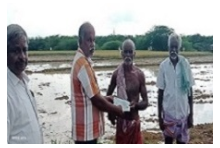Rainfed Farmers growing of lifestyle
par Society for Education,Environment and DevelopmentOurs is primarily an agrarian economy, with much of rural India still practising agriculture as their main occupation. As cities continue to expand, devouring chunks of cultivable land, our poor farmers struggle to arrange for their daily bread. It is terrifyingly ironical that the one who puts food in our bowls prays for a grain in his.
Grants, the donations from charities and individuals, have been of some assistance to the farmers. Yet, the number of farmer suicides in our country continues to claim headlines in our dailies. There is some help, of course, but certainly not enough.
The need of the hour is a thorough inspection of the current condition of Indian farmers, and to take steps towards easing their present state.
It is a Ministry of Agriculture and Farmers Welfare initiative, aimed at providing agricultural insurance and technological assistance to farmers. Under this scheme, the Indian farmers also receive a reimbursement in case they suffer
It has not been of much help till date. A lot of farmers are still unaware of it, and keep falling prey to the conspiracies of private moneylenders.
Direct intervention is almost always the best way to help someone out. we may not always have the time to be physically present to serve a cause we strongly believe in. We can, however, extend our help through someone who cares just as much as we do. Society for education environment Development is one such charity organisation which dedicatedly works towards the upliftment of farmers. They are a Give Assured non-profit entity catering to various social issues, and are currently running a programme focused on providing support to poor farmers.
Sustainability is the way to go when we are working with limited resources and need to preserve them for the future generations. The traditional methods of agriculture rip the soil off the essential nutrients. The excessive use of chemical fertilisers and pesticides is one of the main reasons behind luscious pieces of land losing their fertility. If we start using organic alternatives for these chemical products, the health of soil can easily be restored. Organic farming is one of the best ways for practicing sustainable agriculture, and quite easy to implement as well.
As a society, we should try and encourage these sustainable methods of agriculture, as they are quite nourishing for the soil under cultivation, good for our economy, and of course, very benefiting for our dear farmers!
Selection of seed :
Seed selection plays an important role in paddy cultivation. The seeds selected for cultivation should be of uniform size, age and free of contaminants. They should also have good germination capacity.
Separation of quality seed :
To separate good seed from bad, soak them in water: the unviable seeds will float on the surface of water. These seeds can be easily removed and the seeds that sink can be used for cultivation. By this method, damaged seeds are easily removed.
Seed rate :
The seed rate varies according to the variety to be cultivated. The seed rate required for one hectare of land under irrigated condition is given below:
Dry and rain fed sowing : 85 - 100 Kg
Germination test :
The germination test is considered the most important quality test for evaluating the planting value of a seed lot. The test is designed to measure the ability of seeds to produce normal seedlings and plants later on. The various ways of performing a germination test are listed below:
Tie a handful of seeds in a white cloth, soak it in water for 12 hours and keep in a dark place for 24 hours.
Check the germination percentage the next day.Tie paddy straw together to make it into a mat.
Keep the seeds in the center of the mat and then roll and tie it. Drip it in water for a minute and transfer the seeds to straw.
After 24 hours, count the seeds that have germinated.
Take a wet gunny bag, fold it, put the seeds in between the two layers and keep the bag in the dark for a day.
Check the germination the next day.
Our command area Pudukkottai ,Sivaganga & Ramanathapuram
no irrigation of canal water only use of rain water some time monsoon set heave rainfall current year heave rain the above mentioned area maximum farmers this year Paddy cultivation they are Planting for short term crop likes RNR Cultural variety only 10
Days are growing this year heave rainfall large of. the field lodging water so no recovery of the paddy average of Paddy harvest one acre 4/5 tons but this year water lodging recovery if paddy only below 1 tons so this year average 3 tons loss the normal farmers affected So we are Planning for their lifestyle move of normal life
